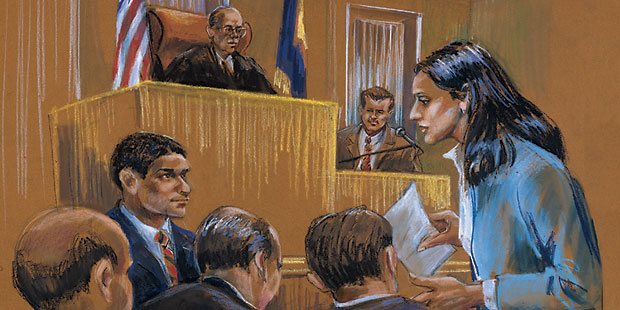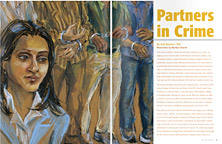Partners in Crime
Printer Friendly VersionIf you were to design a criminal law and justice program from scratch, you might go out and hire the author of the foremost criminal law casebook, a top constitutional scholar, a couple of the world’s leading sociologists of crime and punishment, renowned former defenders and prosecutors, the chief architect of groundbreaking clinical education programs, an economist and expert on business crime, an authority on international criminal law and national security issues, noted experts on Chinese criminal law, a rising sentencing scholar, and acclaimed public interest lawyers who specialize in representing death-row inmates. Or you could just clone the criminal law faculty of the New York University School of Law.
“We have the strongest criminal law faculty in legal academia,” says Professor James Jacobs, the group’s de facto chair and director of the NYU School of Law’s Center for Research in Crime and Justice. Or the most diverse, interdisciplinary, collegial, or innovative faculty, depending on whom you ask. Whichever adjective you settle on, the NYU School of Law offers an embarrassment of riches to students seeking knowledge and training in criminal law. Whether you are interested in combating terrorism or the latest in rehabilitation, leading scholars can be found at NYU.
Along with the world-class faculty are extraordinarily wide-ranging course offerings, research centers, colloquia, and special programs. Policy-makers and practitioners from all over the world regularly converge on Washington Square South to explore critical issues in crime and punishment. Governments and grant-makers routinely single out the NYU School of Law faculty and alumni for important roles in the administration of criminal justice—both here and abroad. The criminal law program and its scholarship has emerged from, and burnishes, the same legacy that brought the NYU School of Law to national prominence during the past 20 years or so.
Making the Case for NYU
In the past decade, the NYU School of Law has welcomed such leading lights as Stephen Schulhofer, co-author of the leading criminal law casebook; David Garland, who virtually invented the field of the sociology of punishment; Jerome Skolnick, a noted sociologist of policing; Anthony Thompson, founder of the country’s first offender reentry clinic; Jennifer Arlen, a 1986 graduate, and one of the few law and economics scholars of corporate wrongdoing; Barry Friedman, an expert in criminal procedure; Kim Taylor Thompson, a national authority on indigent defense; and Bryan Stevenson, a prominent death penalty litigator. Long-time faculty members like Anthony Amsterdam, Paul Chevigny, Harry First, Martin Guggenheim (’71), Randy Hertz, James Jacobs, Holly Maguigan, David Richards, and Harry Subin are recognized throughout the country as being preeminent in their fields as well. Having succeeded in drawing a critical mass of scholars with a central interest in criminal law, the Law School attracts an exceptional group of adjunct faculty. Scholars and practitioners are keen to visit the NYU School of Law and to participate in its lively intellectual community.
It would be difficult to find another law school with such a large criminal law faculty, or a group of professors who are so collegial and interested in one another’s work. “We have built a real sense of community among the criminal law and justice group despite diverse politics, methodologies, and interests,” Jacobs says. “There is great camaraderie and vibrant exchange.” Schulhofer agrees: “The NYU School of Law is home to a variety of academic orientations, offering not just a theoretical approach to the law, but also the perspectives of litigation, empirical research, community service, and intersecting fields like psychology and gender studies. This keeps it stimulating and exciting, especially given the constant opportunities for informal interaction among faculty at weekly lunches, monthly lectures, and programs put on by the Hauser Global Law School Program, the Brennan Center for Justice, and the Center on Law and Security.”
David Garland, the Arthur T. Vanderbilt Professor of Law, who moved with his family from Scotland to join NYU’s faculty permanently after several stints as a visitor, finds the Law School’s intellectual life intense and energizing: “The Law School is like a small university all to itself. The presence of so many great criminal law scholars and clinicians, and the frequent opportunities for interaction at lunches and colloquia, are a tremendous resource and stimulus.” Garland, a professor of both law and sociology, is currently working on a study of capital punishment in U.S. culture. He says he cannot imagine a better place to conduct his research than here, particularly given the presence of colleagues Stevenson, Amsterdam and Hertz, all of whom, says Garland, are legendary figures in the world of death penalty litigation.
As a scholar focused on corporate crime, there were three reasons to come to NYU, says Jennifer Arlen, the Norma Z. Paige Professor of Law: “First, NYU has one of the strongest groups of faculty in three areas important to my work: criminal law, corporate law, and law and economics. Second, being at NYU gives me access to the excellent cadre of visitors—leading people in their fields—who come to NYU. You don’t have to track people down; eventually the best people come here. Third, being at NYU helps me to ground my work in the real world by giving me access to very smart people who practice law in New York, many of whom are involved with NYU as adjunct faculty or participate in events organized by NYU’s Center for Law and Business.” One way Arlen takes advantage of these resources is by caucusing at top law firms such as Wachtell, Lipton, Rosen & Katz and Skadden, Arps, Slate, Meagher & Flom, sharing academic ideas with some of the best lawyers who handle the most complex cases and obtaining critical insights into the real-world institutional dynamics and relationships that influence corporate transactions.
For Harry First, the Charles L. Denison Professor of Law, NYU proved itself a top destination when it lured Arlen to join the faculty. “When Jennifer came here from the University of Southern California, the NYU School of Law became one of the few law schools in the country to have two full-time faculty members who teach business crime,” he says. First served as chief of the Antitrust Bureau in the Office of the New York State Attorney General Eliot Spitzer from 1999 to 2001, directing New York’s antitrust enforcement efforts in cases ranging from bid-rigging to Microsoft. He found that the post provided “a welcome opportunity to see how the practice of law keeps changing and to get a realistic sense of how legal disputes are resolved, tried, and settled today.” First’s hands-on experience in antitrust enforcement is a resource that he draws on in his scholarship and classroom teaching. He is revising his business crimes casebook, in collaboration with Arlen, and intends to deal with the complexity of both today’s white-collar criminal activity and the multiple and overlapping responses by state and federal enforcement agencies. “More than anything,” he says, “I hope that the liveliness and currency of classroom discussion and case analysis has been improved by my stint in public service.” He anticipates even greater strength in NYU’s business crime area with the addition this year of Professor Kevin Davis, formerly of the University of Toronto, who was a visiting professor at the Law School last year.
New York City provides broad opportunities for the Law School’s clinicians who consider the criminal law clinical offerings the best in the nation. According to Randy Hertz, professor of clinical law and director of clinical and advocacy programs, there is no place better than New York City to develop innovative clinical programs given the variety of defenders’ offices and communitybased organizations and the city’s diverse populations with strong civic involvement. He credits the NYU School of Law with making the most of what New York has to offer: “NYU attracts a solid core of public interest law students and consistently hires the best clinicians available, allowing for a large program with great opportunities for interaction in and out of the classroom.”
Two of those clinicians are Kim Taylor-Thompson and Anthony Thompson. Taylor-Thompson was teaching at Stanford Law School and Thompson was in private practice when they got the call from former NYU School of Law dean, now NYU president, John Sexton inviting them to think about a move cross country—something they hadn’t been considering. But once they took a look at the department, they were hooked. “We saw that Randy Hertz presented a high-quality program and we could do some growing professionally,” Thompson says. As if to prove that point, both are working on new books, with expected publication dates in 2005.
The newest member of the criminal law faculty, Professor Rachel Barkow, was also attracted by the unusual spirit of innovation and community at the Law School. Following a clerkship with U.S. Supreme Court Justice Antonin Scalia, and then a stint practicing regulatory law at Kellogg, Huber, Hansen, Todd & Evans in Washington, D.C., Barkow chose to begin her teaching career at the NYU School of Law in part because the place pioneered the requirement of administrative and regulatory law in the first-year curriculum. “I came here because I like working with incredibly smart people who do not rest on their laurels,” Barkow says. “The Law School is full of people who are leaders in their fields yet who are always interested in what a colleague is doing.” As a teacher of both firstyear Administrative Law and Criminal Law, Barkow sees important connections between the two: “When you get involved in the criminal justice system, you are really interacting with an administrative regime.” Given the list of important criminal justice decisions made outside the courtroom—plea bargains, charging decisions, sentencing guidelines, parole board rulings, among others—Barkow’s scholarship has explored the mechanisms of administrative oversight of law enforcement including through jury nullification and sentencing commissions. As the leading young scholar of sentencing law, Barkow recently testified before the Senate Judiciary Committee on reforming the Federal Sentencing Guidelines in the wake of the Supreme Court’s decision last June in Blakely v. Washington, which casts doubt on the guidelines’ constitutionality.
Editor’s note: Since this article was published in September 2004, Erin Murphy has joined the faculty.

